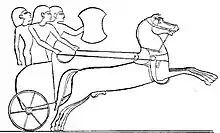chariot
English

Hittite chariot.
Etymology
From Middle English chariot, from Old French chariot, from char (“cart”), from Latin carrus (“wagon”). Displaced native Old English hrædwæġn (literally “fast wagon”).
Pronunciation
- (Received Pronunciation) IPA(key): /ˈt͡ʃæɹɪət/
- (General American) IPA(key): /ˈt͡ʃæɹiət/, /ˈt͡ʃɛɹiət/
Audio (US) (file) - Hyphenation: char‧i‧ot
Noun
chariot (plural chariots)
- A two-wheeled horse-drawn cart, used in Bronze Age and Early Iron Age warfare.
- Synonym: (dated) car
- A light (four-wheeled) carriage used for ceremonial or pleasure purposes.
- (xiangqi) The rook piece.
Derived terms
Related terms
- aurigal
- charret
- charrette
- (driver): charioteer
Translations
vehicle used in warfare
| ||||||||||||||||||
carriage used for ceremonial or pleasure purposes
|
Verb
chariot (third-person singular simple present chariots, present participle charioting, simple past and past participle charioted)
French
Alternative forms
- charriot (post-1990 spelling)
Etymology
Inherited from Old French chariot, from char or from charrier + -ot.
Pronunciation
- IPA(key): /ʃa.ʁjo/
audio (file) - Rhymes: -jo
Noun
chariot m (plural chariots)
- A car/carriage or wagon
- carriage (of a computer printer)
- chariot bloqué
- (Quebec, Louisiana, Missouri, New England) shopping cart
- Synonym: caddie
Derived terms
Further reading
- “chariot”, in Trésor de la langue française informatisé [Digitized Treasury of the French Language], 2012.
This article is issued from Wiktionary. The text is licensed under Creative Commons - Attribution - Sharealike. Additional terms may apply for the media files.